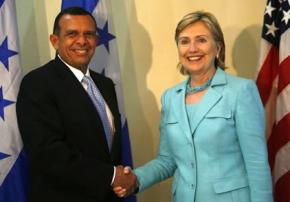U.S. backs Honduras’ sham election
reports on the crackdown and resistance surrounding the bogus presidential vote last weekend in Honduras.
THE COUP regime in Honduras got what it wanted--U.S. blessing for a fraudulent election that aims to install as president Porfirio "Pepe" Lobo, a wealthy rancher and member of the conservative National Party.
Honduran election officials declared that Lobo won the presidential vote by a 16 percentage point margin. But the elections, orchestrated by the military dictatorship that ousted democratically elected President Manuel Zelaya in late June, were far from free and democratic. For many Hondurans, the vote was little more than an attempt to whitewash a coup.
Even as supporters of Lobo were celebrating, Zelaya remained a virtual prisoner in the Brazilian embassy, under close guard by Honduran police and soldiers. In the wake of the vote, the deposed president denounced the results as illegitimate and said he won't accept a U.S.-brokered deal that would possibly have seen him reinstated as president for the two months left in his term.
"Restitution under the conditions of legalizing this electoral fraud cannot be accepted," Zelaya told Radio Globo, as he vowed to go on "risking everything so the transformations in Honduras do not stop."

Whatever Lobo's real margin of victory, his triumph will not have legitimacy. Rather, his win is a victory for a small group of wealthy families that wield enormous power in a country where nearly two-thirds of people live below the poverty line. "We are run by an oligarchy, that's how [this happened]," activist Miguel Alonzo told Britain's Guardian following the election. "They control the economy, and they control politics."
Although election officials claim that voter turnout was 60 percent, Zelaya had encouraged his supporters to boycott the election--and there are claims that the official results are inflated.
The National Resistance Front Against the Coup d'Etat said in a press conference on election day that abstention rates were as high as 65 percent, and that the low turnout forced the country's Supreme Electoral Tribunal to extend voting by one hour in an attempt to get more votes.
Gilberto Rios, a leader of the political group Los Necios, with a base on university campuses, reported to Brazilian activists:
Never in Honduras has abstention been so great. It was over 70 percent, and added to that are 2 percent of invalid ballots and 3 percent of blank ballots. This result is more notable because of the systematic coercion of people to vote by the government and the army...There were neighborhoods where the army, along with Conservatives and Liberal leaders, went directly into the homes to look for the villagers to go and vote--and on Saturday [the day before the election], there were dozens of detainees.
The day after the election, the resistance organized a large caravan in the capital city of Tegucigalpa, in which people proudly showed that their index fingers hadn't been inked at the ballot box. "Lobo is the most minority president in the history of Honduras," Rios added. "Under the conditions of coercion we mentioned, he isn't supported by one in 10 people in Honduras, and in no way represents the people of our country."
PRO-ZELAYA forces faced intense repression in the days and weeks leading up to the vote. The day before the election, according to the Guardian, COMAL, a farming aid organization run by Miguel Alonzo, which had backed Zelaya's boycott call, was raided by masked police and soldiers, who stormed the group's office and took away computers, cash and documents on the pretext that they were looking for weapons.
The same day, soldiers reportedly shot a man in the head at a checkpoint in Tegucigalpa. Throughout the country, others were detained, and some charged with terrorism, under a decree banning gatherings of more than four people.
On election day itself, hundreds of pro-Zelaya protesters marching peacefully in San Pedro Sula were bombarded by police using tear gas and water cannons--dozens were injured or detained.
As union leader Carlos Reyes, one of several presidential candidates who pulled out of the election before it was held, explained to In These Times before the vote: "We are living under a military dictatorship. There is no historical precedent for successful elections under a government like this."
"It will be difficult for the U.S. to carry any Latin American countries with its line, even traditional allies," Shaun Joseph wrote recently on SocialistWorker.org. "Not only is Latin American popular opinion solidly opposed to the Honduras coup, but a section of the region's elite also understands the toppling of Zelaya as an attack on attempts to build capitalist links independent of U.S. imperialism."
In a telephone interview with the Associated Press, Zelaya said that the U.S. had "made a mistake" in recognizing the results of the election. "If they are democrats in their country, they should be democrats in Latin America."


